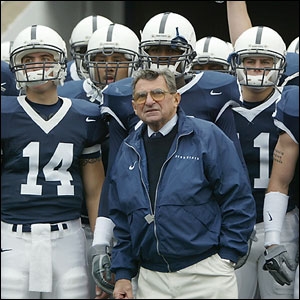
The Moral Failure of Penn State
After the initial wave of damage had taken its toll, after the coach had been fired, the president forced to resign, the athletic director indicted and the former defensive coordinator arrested on 40 counts of sexually assaulting young children, there was still a game to be played. This story is no longer about football – it encapsulates football only in that the man who stands accused used his position within the football program to facilitate his horrible crimes, and that the inaction of the men who ran the program allowed the crimes to continue. The scandal, the shame and the sorrow transcended football. It rendered football meaningless.
But the college football schedule dictated that there was a game to be played at Beaver Stadium on November 12th. The Penn State Nittany Lions would take the field at home, ranked 12th in the country and sporting an 8-1 record, facing the 19th-ranked Nebraska Cornhuskers. Penn State had risen to the top of the Big Ten standings on the strength of their suffocating defense, with their only loss on the year coming to the Alabama Crimson Tide, one of the top teams in the nation. The Nebraska game would be crucial for Penn State’s chances of competing in a major bowl game at the end of the season. Before November arrived, there was no reason to believe that the contest would be anything more than a matchup between two very good football teams.
Penn State took the field last Saturday without their legendary head coach, Joe Paterno, who had been fired by the school’s Board of Trustees three days before. Paterno wasn’t let go for any issues pertaining to his job performance – he won 409 games in 46 years as the coach of the Nittany Lions, and even this season, at 84 years old, he had the team cruising towards another bowl appearance. After nearly five decades of faithful service and success, Paterno’s legacy is irrevocably tarnished, not because of a sudden inability to win games, but for an offense that surpasses football and infringes on the boundaries of basic human decency.

The story behind the scandal at Penn State dates back several decades, to Paterno’s early years as head coach. In 1977, longtime Paterno assistant Jerry Sandusky founded The Second Mile, a non-profit organization that would be based in State College, Pennsylvania, and provide help for underprivileged and at-risk youth. (Sandusky was also promoted to defensive coordinator of the Nittany Lions that same year.) Sandusky would remain at Penn State until his retirement in 1999, though he continued to use the school’s facilities to operate summer football camps. In 2002, he was presented with an Angels in Adoption award for his work with The Second Mile.
Sandusky’s involvement with the organization and the Penn State football program were thrust into focus on November 5th, when he was arrested and charged with 40 counts of sexually abusing young boys, following a three-year investigation by a Pennsylvania grand jury. Characterizing the findings of the grand jury report as disgusting or repugnant would be to sell Sandusky’s actions short; the details in the report are grisly, and readers should be warned of the sickening nature of the accusations levied against the former coach. The report lists eight unidentified victims, each of whom first became acquainted with Sandusky through The Second Mile, and each of who were subjected to varying forms of assault from the sexual predator who ran Penn State’s defense for 22 years.
Sandusky, for his part, professed his innocence in an exceedingly uncomfortable interview with NBC’s Bob Costas on Monday (though it took him a surprising amount of time to deny that he was sexually attracted to young boys). If Sandusky is, in fact, guilty of these unspeakable crimes (as every other source of testimony indicates), he faces a potential life sentence in prison. Much of the focus on the case, however, has fallen not on Sandusky, but on the men who turned a blind eye on the allegations and allowed Sandusky’s actions to continue – most notably, Paterno, former Penn State athletic director Tim Curley and former school president Graham Spanier.

The most damning revelation in the grand jury report comes from Nittany Lions assistant coach Mike McQueary, who testified in December 2010 that he had witnessed Sandusky engaging in anal intercourse with a boy of approximately ten years old in a shower at the Penn State football complex. (The incident occurred in 2002, when McQueary was a graduate assistant. The victim is identified as Victim 2 in the report.) McQueary informed Paterno of what he had witnessed the next day. Paterno, in turn, reported the incident to Curley, who passed on the information to Spanier. None of the men brought it to the attention of university or local police. Curley eventually made the decision to bar Sandusky from the Penn State locker room, though the former coach would remain free from the law for nine more years.
It is apparent that Paterno, Curley and Spanier were more interested in protecting the brand that is Penn State football than in bringing Sandusky to justice. After the grand jury determined his testimony to be not credible, Curley was charged with perjury; he has been placed on administrative leave. After 16 years as president of the university, the Board of Trustees fired Spanier on November 9th. He remains a potential target of the investigation.
The bulk of the media coverage has fallen, predictably, on the beloved head coach, Paterno, whose statue stands in the concourse outside Beaver Stadium. After his firing was announced last Wednesday, despondent Penn State students rioted on campus in protest, flipping over a news van and imparting the message that football would take precedence over the welfare of Sandusky’s victims. (To their credit, Penn State students would hold a candlelight vigil for victims of child abuse two days later, after the national media rightfully skewered them for the knee-jerk reaction to Paterno’s dismissal.)

Paterno is not directly culpable for any legal offense, as Pennsylvania is not one of 18 states that require all adults to report suspected child abuse to the police. The Pennsylvania Attorney General has stated that Paterno will not be investigated for his role in the case. Paterno instead failed the moral obligation of stopping Sandusky when he had the chance – armed with the information presented to him by McQueary, Paterno (along with Curley and Spanier) chose to stand idly by as Sandusky continued to prey on young children, threatened with nothing but his banishment from the Penn State locker room.
While the Board of Trustees was right to immediately relieve Paterno and Spanier from their duties, both the school and the football program face a long road to recovery. Tom Bradley, Sandusky’s replacement as defensive coordinator in 2009, has replaced Paterno as head coach in the interim, while a new athletic director will need to be hired. It remains to be seen if the Penn State student body will be remembered for the ill advised riot in the wake of Paterno’s firing or for whatever actions they take in the near future to restore the reputation of their university.
As for Paterno, his legacy has been tarnished beyond repair. He isn’t the first college football coach to undo decades of success with a single miscue – Woody Hayes’ assault on an opposing player springs to mind – but he is at the forefront of the most severe scandal in the history of collegiate sports. The victims of Jerry Sandusky’s sexual abuse will, hopefully, recover as best they can. Sandusky, meanwhile, should spend the rest of his life rotting away in a federal prison, while Paterno will spend the rest of his life wondering what he could have done to prevent a tragedy from unfolding in State College.
Of course, before anything else was to be done, a football game had to be played. Penn State took the field last Saturday without their legendary head coach, who watched from his home a few blocks north of Beaver Stadium. They lost 17-14.













